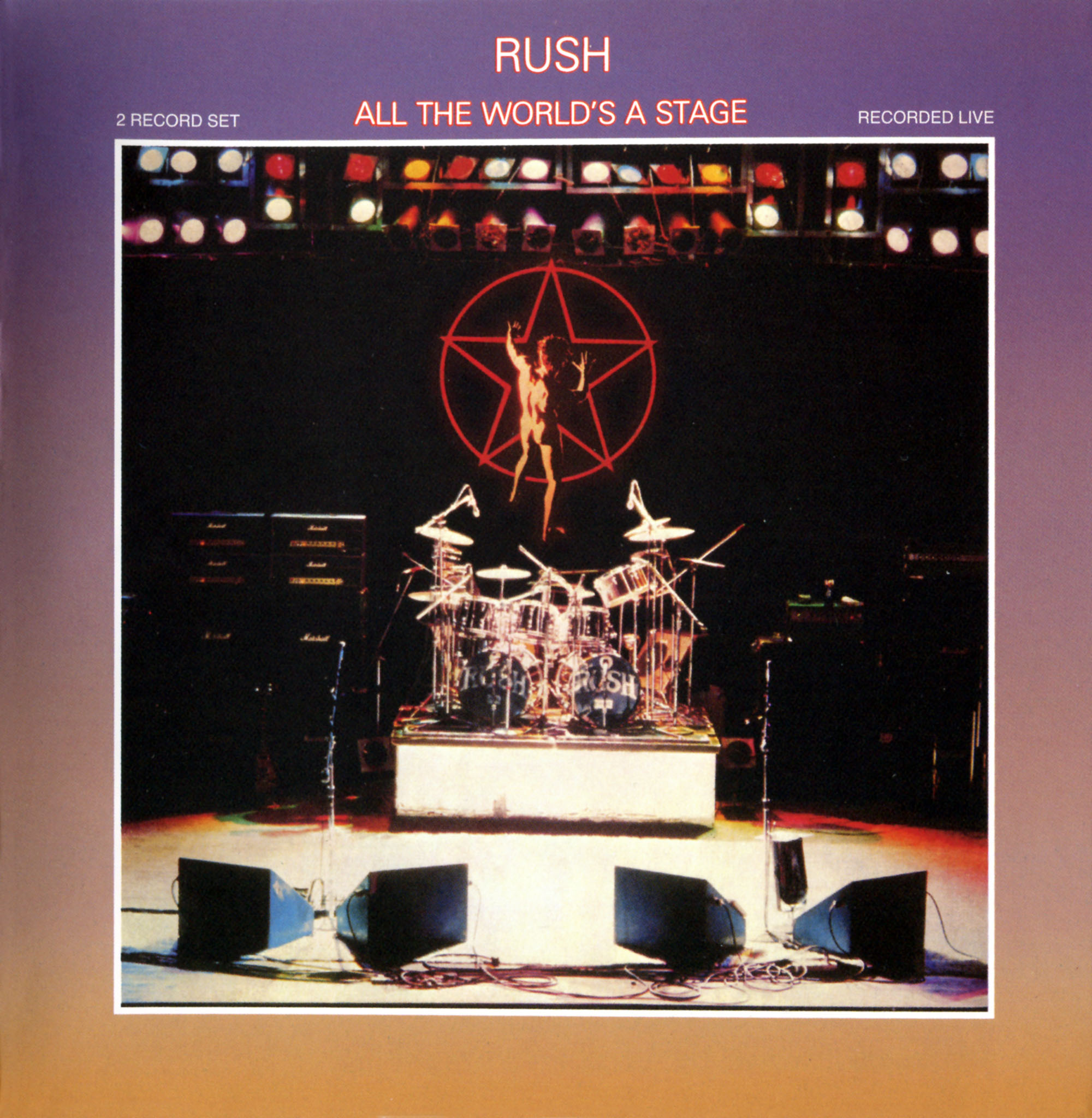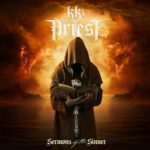All The World’s A Stage: Shakespeare Through the Lens of Rush
Rush have a long history of using literary themes in their songs. Songs like “Tom Sawyer” have obvious sources. Other adaptations are less clear. If not for the liner notes explicitly giving thanks “To the genius of Ann Rand,” the author’s influence in “2112” may have been missed entirely. Yet, when the band invokes Shakespeare, the public immediately recognizes the immortal bard.

Rush has utilized the line “All the world’s a stage” twice in their career. Taken from Shakespeare’s comedic play, As You Like It, the connection between theater and music is obvious. For any group of touring musicians, the world is indeed a stage.
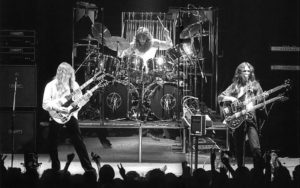
Lyricist Neal Peart manages to coax a myriad of meanings from the seemingly simple line. The acclaimed drummer has encouraged listeners to “have the sensitivity to pay the kind of attention to lyrics that I put into them.” Given Peart’s deliberate complexity, it’s unsurprising that multiple associations exist between Rush’s usage of “All the World’s a Stage” and the world of Shakespeare.
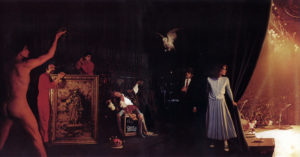
The famous line is taken from the “seven ages of man” speech. As the melancholic Jacques laments the impermanence of life, he notes that “All the world’s a stage/And all the men and women merely players” (AYLI 2.7.141-142).
Mortal life proceeds through universal stages. Man begins his journey as an infant before growing into adolescence. Early adulthood brings the role of soldier until old age renders him a “second childishness” before slipping into “mere oblivion” (AYLI 2.7.166). All in all, life unfolds in seven distinct phases.
It is significant that Rush quotes “All the world’s a stage” during transitional periods in their career. Given Peart’s urging for “sensitivity” in lyric interpretation, a connection between Jacques’s speech and distinct epochs in the band’s development is clear.
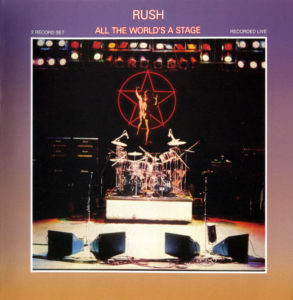
Rush first incorporated the famous phrase with the record, All The World’s A Stage. As a live album, the title clearly relates to performance. Yet, a cursory glance at the liner notes reveals a larger connection to the “seven ages of man” speech.
This album to us, signifies the end of the beginning,
a milestone to mark the close of chapter one, in the annals of Rush.
Concluding the first stage of their career with a record titled with All The World’s a Stage was no coincidence. Not only does the title fit with the speech’s message of growth, a deeper connection to the genre of comedy exists. To fully grasp this relation, a brief history of Rush is in order.
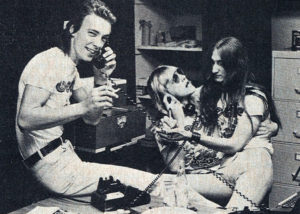
Formed in Canada, Rush secured a four-album deal with Mercury Records. With corporate resources that allowed extensive touring, Rush embarked on a quest to conquer North America. Propelled by the hit single “Working Man,” both record label and band were optimistic about the future!
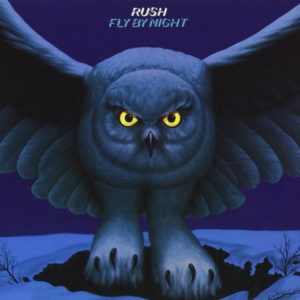
With their second album, Fly By Night, Rush began to stray from their style of Led Zeppelin inspired rock. At the heart of their new direction was “By-Tor and the Snow Dog.” A thematic track lasting nearly 9 minutes, the song was arranged into four sections. Beginning in Hades, the listener was transported across the river Styx. An instrumental section soon emerged to represent battle before shifting into an “epilogue” to complete the song.
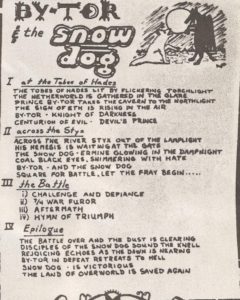
While “By-Tor” was ambitious and fun, a sprawling rock epic did little to capture the attention of the average rock fan. Mercury Records firmly made it clear that Rush were not “developing in the correct way.” The little band from Canada would prove to be a rebellious bunch.
Feeling that long, epic songs were their calling, the band followed their instincts during the composition of album number three. After crafting the 12-minute, J.R.R. Tolkien inspired track, “The Necromancer,” Rush continued to push their limits. Side Two was devoted to the nearly 20 minute track, “The Fountain of Lamneth.” In comparison, “By-Tor” was a mere pop song.
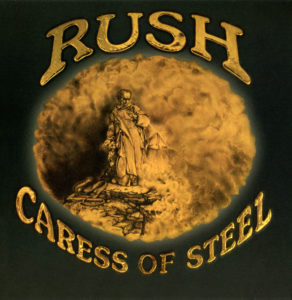
Caress of Steel brought near financial ruin. Dismal record sales and paltry concert attendance led the band to nickname the album’s promotional dates “The down the tubes tour.” At this point the record company gave Rush an ultimatum. Either write short, radio friendly rock songs or their recording contract would not be renewed.
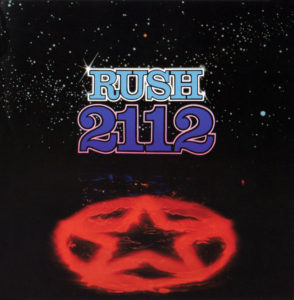
Unwilling to sacrifice creative control, the band soldiered on to write the concept album 2112. Despite lack of radio play, word of mouth fueled record sales. The band’s conscious challenge to executive authority resulted in unanticipated commercial success.
Reflecting on the experience, lead singer Geddy Lee observed, “2112 really bought us our independence” with Neal Peart adding, “After that, the record company never said a word about creative control.” The little band from Canada stood up to the Goliath corporate entity of Mercury Records and won!
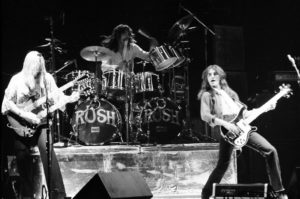
All The World’s A Stage documents the band’s homecoming show during the 2112 tour. In many ways the show was a victory lap. It was precisely this moment of triumph that connects Rush with the genre of comedy.
Noted Shakespeare scholar Russ McDonald maintains that comedy “moves toward a happy ending and implies a positive understanding of human experience” (81). Certainly a live album documenting the success of a band that nearly failed meets the requirement of “a happy ending.”
Furthermore, the record marks the end of a long journey in which the band faced dismal odds. Persistence, self-belief, and an embrace of artistic integrity have been rewarded. As an album title, All The World’s A Stage reflects “a positive understanding of human experience” as personally experienced by Rush.
Finally, after years of conflict, there is reconciliation between Rush and Mercury Records, satisfying the coming together requirement of the comic ending in which “some kind of union or reunion that resolves the conflict and brings the characters into a state of harmony” (McDonald 81).
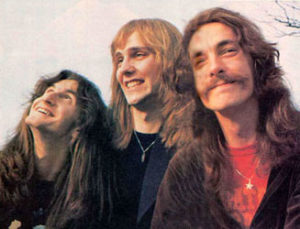
Years later Rush revisited the phrase in the song “Limelight.” The song recounts the intrusive nature of fame, addressing the inadequacy of being “ill-equipped to act” under the scrutiny of the “camera eye.” When Geddy Lee sings, “All the world’s indeed a stage and we are merely players,” the sentiment of being exposed before the public is conveyed. Yet, as was the case with the band’s previous adaptation of Jacques’s speech, there is a secondary connection.
In “Limelight,” the seven ages of man is linked to the band’s evolution once again. Like the 2112 album and subsequent tour that resulted in All the World’s a Stage, Moving Pictures represented a turning point for the band. There is a distinct abandonment of the twenty-minute song that filled an entire album side with a connected story theme. The actual sound of the band had begun to evolve, with synthesizers becoming prominently featured and Geddy Lee’s high-pitch yelp being noticeably toned down.
It was an experiment that had begun on the previous album but had now come full circle. The band viewed this creative growth as a defining moment in their career. Neal Peart summed up this sentiment, explaining, “As I define it, that’s when we became us. I think Rush was born with Moving Pictures.”
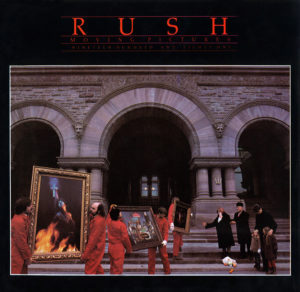
As in Jacque’s initial reflection, life unfolds in a series of distinct stages. The career of a rock band is no different. Growth is inherent in both life and art. When looking backwards in the same reflective nature employed by Jacques, the music of Rush unfolds in distinct, observable stages. It was an ongoing evolution that continued for the group’s entire career.


The rich variety of meanings that Rush has coaxed from a single line is a testament to the depth of Shakespeare’s command of language. The fact that a modern performer can utilize a line from a late-sixteenth century play and effectively relate that phrase to contemporary life is an example of the timeless human values inherent in the dramatic works of William Shakespeare.
Works Cited
McDonald, Russ. The Bedford Companion to Shakespeare: An Introduction with Documents. Boston: Bedford, 2001. Print.
Rush: Beyond the Lighted Stage. Dir. Sam Dunn and Scott McFadyen. Banger Films, 2010. DVD.
Shakespeare, William. As You Like It. Ed. Juliet Dusinberre. London: Thomson Learning, 2006. Print.

